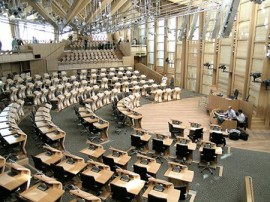
I have often thought that the saving grace of the British constitution was that, given how undemocratic, unbalanced and inefficient it is, at least it is interesting. Each part of the United Kingdom has its own particular and different relationship with the national government; why, even the adjective “British” in the opening sentence is something of a misnomer.
For Federal Union, an organisation interested in nationality and identity and how they interact with notions such as democracy and territory, the UK system of government has much to look at. We can learn about how things ought to be from such a vivid illustration of what can go wrong.
In that spirit, I was delighted to receive some questions e-mailed from abroad asking about the peculiar position of Scotland with the union.
Question: What would happen if the Scottish Parliament decided to vote in favour of the independence of Scotland ? Can they do that? Regardless of it been illegal could it be considered a legitimated decision?
Yes, even though it would be Westminster and not Edinburgh that has the power to adopt a law on a binding referendum, it is not seriously disputed that the result of a referendum called by the Scottish Parliament could be disregarded for that reason alone. Note, though, that there would also have to be a negotiation between the UK and Scotland on the terms of any separation, which, it is credibly argued by Robert Hazell of the Constitution Unit, would require approval in a second referendum. If there were to be a second referendum to confirm the terms, then it matters even less if the first referendum is called by the Scottish Parliament and not by Westminster.
Question: What would happen in case there is a referendum in Scotland and the majority of people decide in favour of the independence of Scotland?
There would have to be negotiations to agree the terms of partition. There might well be a further referendum in Scotland to agree those terms. There would also be the question of Scottish membership of the EU: the Scottish government argues that this would be automatic; other voices disagree and say that Scotland would have to apply as a non-member. (This is a fascinating question of federalist theology …)
Question: Does the British government have the power to withdraw the autonomy to Scotland in these circumstances? Do you think they would hesitate using the force?
This is a very interesting and complicated question. The basis of Scottish membership of the UK is the Act of Union of 1707, which is an agreement between the then English and Scottish parliaments, and which includes some commitments to Scottish autonomy. (The people who say that an intergovernmental treaty can never amount to constitution are wrong, as the union between England and Scotland proves.) More recently, the Scotland Act of 1998 set up the Scottish Parliament. This could be revoked by Westminster on its own, but that would surely provoke a stronger determination in Scotland for independence.
There is no question of any use of force to suppress any kind of lawful secessionist move. In the case of Northern Ireland, the Downing Street Declaration of 1993 acknowledged that
“The Prime Minister, on behalf of the British Government, reaffirms that they will uphold the democratic wish of a greater number of the people of Northern Ireland on the issue of whether they prefer to support the Union or a sovereign united Ireland. On this basis, he reiterates, on behalf of the British Government, that they have no selfish strategic or economic interest in Northern Ireland.”
The same principle would apply in Scotland. It is up to the Scots what they want to do. Again, this is an interesting question from the point of view of federalists, when a state voluntarily accepts a reduction in its state-like powers. Thinking of institutions as either “a state” or “not a state” doesn’t capture the complexity of the modern world.
This article was written by Richard Laming, who may be contacted at [email protected]. Opinions expressed are those of the author and not necessarily those of Federal Union. 21 February 2010.
